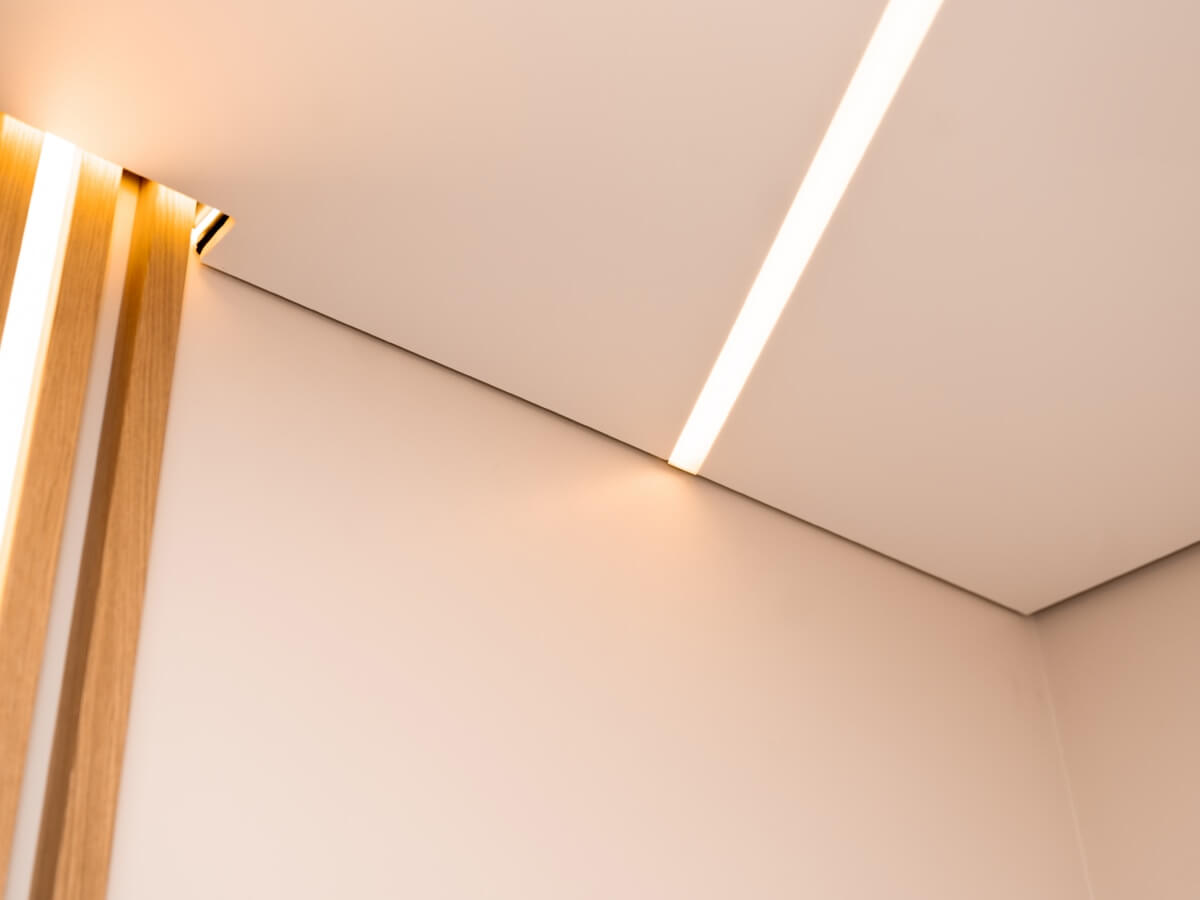Shadow gap in a stretch ceiling: elegance and modernity in details
With a 15-year warranty from 20 Euro/m²
We giving gifts!5% discount! For customers who order the installation of a stretch ceiling within 24 hours of receiving the calculation!
Calculator
Description of the shadow gap in a stretch ceiling: details and technology
A shadow gap in a stretch ceiling is a modern and sophisticated design technique that allows you to create the effect of a floating ceiling, giving the interior lightness, airiness and emphasized elegance. This method involves creating a small but clearly defined gap between the stretch fabric and the wall, which visually separates the ceiling from vertical surfaces, creating a stylish and modern accent.
A shadow gap in a stretch ceiling is achieved through the use of special profiles designed for this purpose. These profiles are installed along the perimeter of the room, providing a certain distance between the stretch fabric and the wall. Usually, this distance is from 1 to 2 centimeters, but it can vary depending on the designer's idea. The profile creates a clear border and directs the light in such a way that a shadow line is formed, emphasizing the separation of the ceiling from the wall. This technique can be implemented with various types of stretch ceilings, including PVC film (matte, glossy, satin) and fabric canvases.
Advantages of the shadow gap: aesthetics, installation, technological capabilities and design variability
Aesthetics: visual lightness and modern style
The shadow gap has a number of significant aesthetic advantages:
The effect of a floating ceiling
The shadow gap creates a visual effect of lightness and floating, making the ceiling less massive and giving the interior airiness.
Modern and minimalist look
The clear lines and laconicism of the shadow gap are ideal for modern and minimalist interiors, emphasizing their style.
Emphasis on the geometry of the room
The shadow gap emphasizes the geometry premises, focusing on lines and shapes.
Installation: features and process
Installation of a shadow gap has its own features:
Use of special profiles
To create a shadow gap, special profiles are used, which provide the necessary indentation and clarity of the line.
Installation accuracy
Installation requires high precision and accuracy to ensure an even and aesthetic result.
Technological capabilities: functionality and integration
A shadow gap opens up additional technological possibilities:
Hiding uneven walls
A shadow gap helps to hide small unevenness of the walls, creating a more even and neat look.
Backlight integration
LED strips can be installed in the resulting niche to create contour lighting, adding additional visual effect.
Design variability: adaptability to various styles
The shadow gap is highly variable in design:
Combination with various types of ceilings
The shadow gap can be used with various types of stretch ceilings, including matte, glossy, satin and fabric.
Adaptation to various interior styles
The shadow gap goes well with various interior styles, from minimalism and loft to modern classic solutions.
Examples of using shadow gaps in stretch ceilings: from home to office
High ceilings: emphasizing volume and lightness
In rooms with high ceilings, the shadow gap especially effectively emphasizes the volume of space, adding lightness and airiness to it.
Minimalist interiors: creation accent
In minimalist interiors, where there are no other pronounced decorative elements, the shadow gap itself becomes a stylish accent.
Rooms with a complex configuration: highlighting zones
In rooms with a complex configuration, the shadow gap helps to emphasize the geometry of the walls and ceiling, highlighting individual zones and creating clear boundaries.
Modern offices: creating a stylish work environment
The shadow gap is used in modern offices to create a stylish and elegant work environment, emphasizing the modern design.
Conclusion: a modern solution for a stylish interior
The shadow gap in the stretch ceiling is a modern and functional design technique that allows you to create stylish, elegant and visually attractive interiors. It gives the ceiling lightness, emphasizes the geometry of the room, goes well with various styles and opens up additional opportunities for integrating lighting. When choosing a shadow gap, it is important to consider the characteristics of the room, personal preferences and professional recommendations to achieve the best result.


